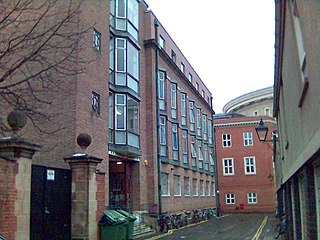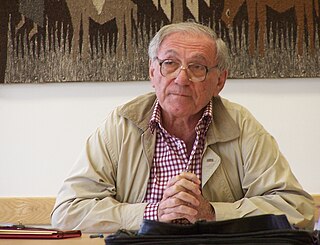Indology or Indian studies is the academic study of the history and cultures, languages, and literature of India and as such is a subset of Asian studies.

Middle Eastern studies is a name given to a number of academic programs associated with the study of the history, culture, politics, economies, and geography of the Middle East, an area that is generally interpreted to cover a range of nations including Egypt, Iran, Iraq, Israel, Jordan, Lebanon, Oman, Palestine, Saudi Arabia, Syria, Turkey, and Yemen. It is considered a form of area studies, taking an overtly interdisciplinary approach to the study of a region. In this sense Middle Eastern studies is a far broader and less traditional field than classical Islamic studies.
Toshihiko Izutsu was a Japanese philosopher of language and mysticism and an Islamic scholar. He was a Professor at Keio University in Japan and author of many books on Islam and other religions. Izutsu taught at the Institute of Cultural and Linguistic studies at Keio University in Tokyo, the Iranian institute of Philosophy in Tehran, and McGill University in Montreal, Quebec, Canada. He was fluent in over 30 languages, including Arabic, Persian, Sanskrit, Pali, Chinese, Japanese, Russian and Greek.

Oriental studies is the academic field of study that embraces Near Eastern and Far Eastern societies and cultures, languages, peoples, history and archaeology; in recent years the subject has often been turned into the newer terms of Middle Eastern studies and Asian studies. Traditional Oriental studies in Europe is today generally focused on the discipline of Islamic studies, while the study of China, especially traditional China, is often called Sinology. The study of East Asia in general, especially in the United States, is often called East Asian studies.

Iranian studies, also referred to as Iranology and Iranistics, is an interdisciplinary field dealing with the study of the history, literature, art and culture of Iranian peoples. It is a part of the wider field of Oriental studies.

The Faculty of Oriental Studies, is the University of Oxford's department of Asian and Middle East Studies.

Sadiq Jalal Al-Azm was a Professor Emeritus of Modern European Philosophy at the University of Damascus in Syria and was, until 2007, a visiting professor in the Department of Near Eastern Studies at Princeton University. His main area of specialization was the work of German philosopher Immanuel Kant, but he later placed a greater emphasis upon the Islamic world and its relationship to the West, evidenced by his contribution to the discourse of Orientalism. Al-Azm was also known as a human rights advocate and a champion of intellectual freedom and free speech.

The Graduate School of Arts and Sciences is the graduate school of Columbia University. Founded in 1880, GSAS is responsible for most of Columbia's graduate degree programs in the humanities, social sciences, and natural sciences. The school offers MA and PhD degrees in approximately 78 disciplines.

Sheldon I. Pollock is a scholar of Sanskrit, the intellectual and literary history of India, and comparative intellectual history. He is currently the Arvind Raghunathan Professor of South Asian Studies at the Department of Middle Eastern, South Asian, and African Studies at Columbia University. He was the general editor of the Clay Sanskrit Library and is the founding editor of the Murty Classical Library of India.

Wael B. Hallaq is a scholar of Islamic law and Islamic intellectual history and the Avalon Foundation Professor in the Humanities at Columbia University. He is considered a leading scholar in the field of Islamic legal studies, and he has been described as one of the world's leading authorities on Sunni fiqh, or jurisprudence.

Ji Xianlin was a Chinese Indologist, linguist, paleographer, historian and writer who has been honored by the governments of both India and China. Ji was proficient in many languages including Chinese, Sanskrit, Arabic, English, German, French, Russian, Pali and Tocharian, and translated many works. He published a memoir, The Cowshed: Memories of the Chinese Cultural Revolution, about his persecution during the Cultural Revolution.

Edward Wadie Said was a professor of literature at Columbia University, a public intellectual, and a founder of the academic field of postcolonial studies. A Palestinian American born in Mandatory Palestine, he was a citizen of the United States by way of his father, a U.S. Army veteran.
The Rutgers University Department of African, Middle Eastern, South Asian Languages and Literatures(AMESALL) is dedicated to the study of Africa, the Middle East, and South Asia. It is the primary academic home of sixteen core faculty and seven part-time lecturers. AMESALL provides instruction in over a dozen languages from these three regions. It offers courses taught in English and regional languages such as Arabic and Hindi, and regularly hosts events such as lectures, workshops, and conferences for the student body, the faculty, and the general public.
Ludo Rocher (1926-2016) was an eminent Sanskrit scholar, and the W. Norman Brown Professor Emeritus of South Asia Studies at the University of Pennsylvania.
The Tashkent State University of Oriental Studies is a state institution of higher education in Tashkent, the capital of Uzbekistan. Founded in November 1918, the school is the only Oriental-studies institute in Central Asia and Asia's oldest Oriental institute of higher education. It is one of the largest schools of its kind in Asia and the former Soviet Union.
Gil Z. Hochberg is the Ransford Professor of Hebrew and Visual Studies, Comparative Literature, and Middle East Studies at Columbia University. She has written two well-regarded academic books. Visual Occupations: Vision and Visibility in a Conflict Zone (2015) examines the politics of visibility in Palestine/Israel through film, art and photography. Her first book, In Spite of Partition: Jews, Arabs and the Limits of Separatist Imagination (2007), focuses on literary works that complicate binary formulations of identity in Palestine/Israel and that foreground complex and fraught histories in common.
Comparative Studies of South Asia, Africa and the Middle East (CSSAAME) is a triannual peer-reviewed academic journal covering Comparative Studies on Africa, the Middle East, and South Asia. It provides a "critical and comparative analyses of the histories, cultural productions, social and gender relations, politics, and economies" of these regions. It is published by the Duke University Press, and since 2012, edited at Columbia University.
Brian T. Edwards is dean of the School of Liberal Arts and professor of English at Tulane University in New Orleans, Louisiana. Prior to moving to Tulane in 2018, he was on the faculty of Northwestern University, where he was the Crown Professor in Middle East Studies, professor of English and Comparative Literary Studies, and the founding director of the Program in Middle East and North African Studies (MENA).











